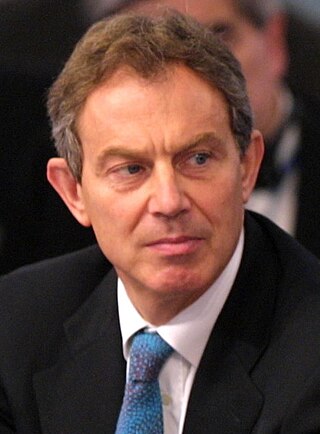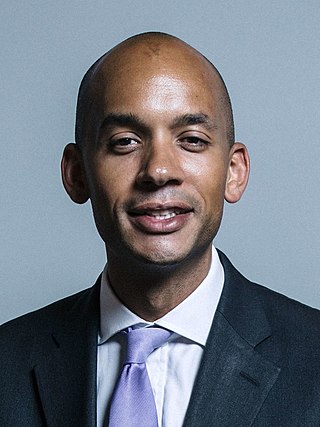
The 2001 United Kingdom general election was held on Thursday 7 June 2001, four years after the previous election on 1 May 1997, to elect 659 members to the House of Commons. The governing Labour Party led by the prime minister Tony Blair was re-elected to serve a second term in government with another landslide victory with a 165-seat majority, returning 412 members of Parliament versus 418 from the previous election, a net loss of six seats, although with a significantly lower turnout than before—59.4%, compared to 71.6% at the previous election.

The 1997 United Kingdom general election was held on Thursday, 1 May 1997. The governing Conservative Party led by Prime Minister John Major was defeated in a landslide by the opposition Labour Party led by Tony Blair, achieving a 179-seat majority and a total of 418 seats.

The politics of Scotland operate within the constitution of the United Kingdom, of which Scotland is a country. Scotland is a democracy, being represented in both the Scottish Parliament and the Parliament of the United Kingdom since the Scotland Act 1998. Most executive power is exercised by the Scottish Government, led by the First Minister of Scotland, the head of government in a multi-party system. The judiciary of Scotland, dealing with Scots law, is independent of the legislature and the Scottish Government. Scots law is primarily determined by the Scottish Parliament. The Scottish Government shares some executive powers with the Scotland Office, a British government department led by the Secretary of State for Scotland.

The 2010 United Kingdom general election was held on Thursday 6 May 2010, to elect Members of Parliament to the House of Commons. The election took place in 650 constituencies across the United Kingdom under the first-past-the-post system. The election resulted in a large swing to the opposition Conservative Party led by David Cameron similar to that seen in 1979, the last time a Conservative opposition had ousted a Labour government. The governing Labour Party led by the prime minister Gordon Brown lost the 66-seat majority it had previously enjoyed, but no party achieved the 326 seats needed for a majority. The Conservatives won the most votes and seats, but still fell 20 seats short. This resulted in a hung parliament where no party was able to command a majority in the House of Commons. This was only the second general election since the Second World War to return a hung parliament, the first being the February 1974 election. This election marked the start of Conservative government for the next 14 years.

Chuka Harrison Umunna is a British businessman and former politician who served as Member of Parliament (MP) for Streatham from 2010 until 2019. A former member of the Labour Party, he was part of the Shadow Cabinet from 2011 to 2015. He left Labour in February 2019, when he resigned to form The Independent Group, later Change UK, along with six other MPs. Later in 2019, he left Change UK and, after a short time as an independent MP, joined the Liberal Democrats. In the 2019 general election, he failed to be re-elected, and did not return to the House of Commons.

The Liberal Democrats are a liberal political party in the United Kingdom, founded in 1988. The current leader of the party is Ed Davey. They are the third-largest party in the United Kingdom, with 72 members of Parliament (MPs) in the House of Commons. They have 79 members of the House of Lords, four members of the Scottish Parliament, one member in the Welsh Senedd, and more than 3,000 local council seats. The party holds a twice-per-year Liberal Democrat Conference, at which party policy is formulated. In contrast to its main opponents' rules, the Liberal Democrats grant all members attending the conference the right to speak in debates and vote on party policy, under a one member, one vote system. The party also allows its members to vote online for its policies and in the election of a new leader.

Matthew James Offord is a British Conservative Party politician who served as the Member of Parliament (MP) for Hendon in North London from 2010 to 2024. He was previously a member of the Association of European Parliamentarians with Africa Governing Council.

The 2019 United Kingdom general election was held on Thursday, 12 December 2019, with 47,567,752 registered voters entitled to vote to elect 650 Members of Parliament (MPs) to the House of Commons. The governing Conservative Party led by the prime minister, Boris Johnson, won a landslide victory with a majority of 80 seats, a net gain of 48, on 43.6 per cent of the popular vote, the highest percentage for any party since the 1979 general election, though with a narrower popular vote margin than that achieved by the Labour Party over the Conservatives at the 1997 general election. This was the second national election to be held in 2019 in the United Kingdom, the first being the 2019 European Parliament election.
The region of the East of England is divided into 61 parliamentary constituencies which is made up of 14 borough constituencies and 47 county constituencies. Since the general election of July 2024, 27 are represented by Labour MPs, 23 by Conservative MPs, seven by Liberal Democrat MPs, three by Reform UK MPs, and one by a Green MP.
The region of West Midlands is divided into 57 parliamentary constituencies which is made up of 28 borough constituencies and 29 county constituencies. Since the general election of July 2024, 38 are represented by Labour MPs,15 by Conservative MPs, 2 by Liberal Democrat MPs, and 1 by an independent MP.
Change UK, founded as The Independent Group (TIG) and later The Independent Group for Change, was a British centrist, pro–European Union political party, which lasted for ten months in 2019. Established in February and formally recognized as a party in May, it was dissolved in December after all its MPs lost their seats at that year's general election. Its principal aim was a second withdrawal referendum on European Union membership, in which it would campaign to remain in the EU. On economic issues it expressed a commitment to the social market economy.

The 2019 United Kingdom general election was held on 12 December 2019 to elect all 650 members of the House of Commons, including the 40 Welsh seats.
The Climate and Nature Bill, formerly promoted as the Climate and Ecology Bill, is a private member's bill before the Parliament of the United Kingdom aimed at tackling the climate crisis and environmental disaster.

This article lists the election results of Change UK in UK parliamentary elections and in elections to the European Parliament.









